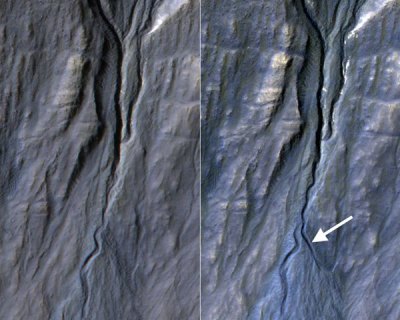Gullies on Mars formed by carbon dioxide

A camera on a NASA orbiter spotted a new channel formed on a Martian slope between 2010-2013. Image: NASA/California Institute of Technology/University of Arizona.
Water is necessary for life. and life on Mars would mean ... well, it would mean we all collectively poop in our pants. The red planet has both water vapor and frozen water, according to NASA. Indeed, researchers once thought the gullies spotted by sophisticated telescopes and orbiters were formed thousands to millions of years ago when climate conditions were possibly conducive to liquid water on Mars.
But scientists writing in the journal Icarus now say that those gullies have been formed by the seasonal freezing of carbon dioxide – not by water.
Using data from a NASA orbiter, the scientists examined gullies at 356 sites on Mars beginning in 2006. Thirty-eight sites showed active gully formation, such as new channel segments and increased deposits at the downhill end of some gullies.
Studying before-and-after images, scientists determined that the timing of this activity coincided with seasonal carbon dioxide frost and temperatures that would not have allowed for liquid water.
Frozen carbon dioxide, commonly called dry ice, does not exist naturally on Earth. But Mars has it, and researchers have linked it to carbon dioxide gas geysers and lines on sand dunes plowed by blocks of dry ice.
Possible action by liquid water on Mars has been reported in the past year in other findings. An upcoming special issue of Icarus will include multiple reports about active processes on Mars, including smaller flows that are strong indications of the presence of liquid water on Mars today, according to NASA.
Related:

